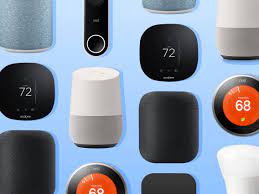The competition for the best smart home system is very hot. With three major players—Apple, Amazon, and Google—fielding strong contenders, deciding which smart home system is best for you can be tough.
Amazon Alexa, Google Home, and Apple HomeKit are all solid options for those who need a smart home hub to automate their homes. But which is the best bet when searching for a reliable smart home system? let’s take a look.
Amazon alexa
Amazon Alexa is by far the most popular and widely used smart home technology. It has held this position for many years, and rightly so. One of its most important selling points as a smart home system is the sheer number of speakers available.
Smart speakers act as smart home hubs. They serve as the nerve center for your smart home automation. Smart speakers anchor your smart device ecosystem, enabling your smart devices from different manufacturers to connect and interact with each other.
You’d be hard-pressed to find a smart speaker that offers as much functionality as Amazon’s line of Echo speakers. The Echo Show product line that comes with an interactive display makes using Alexa for everyday tasks a delightful experience.
Voice assistant
Voice assistants are an integral part of what makes smart home systems so exciting to use. Technology is the brain of a smart home ecosystem. How smart your home can be depends on the capability of the voice assistant driving it. Luckily, Alexa is smart enough.
In terms of mastery numbers, Alexa posts a big number. According to Statista, Alexa has over 100,000 unique skills. Skills are third-party creations that extend Alexa’s functionality.
Alexa offers lots of personalization options. It can be trained to recognize up to 10 different voices. This ensures that every user with access to an Alexa unit can have a uniquely tuned smart home experience.
Although Alexa can recognize dozens of languages, it has poor language coverage compared to Siri and Google Assistant. On the positive side, unlike its competitors, Alexa allows users to change its default wake word. You can choose Ziggy, Amazon, Echo or Computer as your preferred wake word.
Alexa also excels in music and entertainment, with access to dozens of music and video streaming platforms. The Echo speaker line delivers good-quality audio output, including the smaller-sized Echo Dot
Compatible devices
Alexa’s popularity as a smart home hub is partly driven by its wide-reaching compatibility. A report by Statista suggests that Alexa is compatible with nearly 100,000 smart home devices.
Thanks to Amazon’s aggressive collaborations with smart gadget makers, most popular smart home gadgets are compatible with Alexa.
Google Home
Google Home is the second most widely used smart home ecosystem. Although Google Home is relatively young, it is rapidly closing in on — and in some areas — eclipsing Amazon Alexa’s lead as the preferred smart home system.
Budget smart speakers are at the heart of Google’s battle for dominance as the best smart home system. With smart speakers like the Nest Mini and Home Mini, Google is keeping the barrier to entry for adoption of the Google Home ecosystem as low as possible.
With budget options, you might not get the best in bass and sound quality, but it’s no less smart either. Google’s home ecosystem is supported by a vast range of Google-branded smart devices. The company’s open-door policy towards collaboration leaves room for exciting possibilities within your smart home.
Voice assistant
Google Assistant is the voice assistant at the heart of any Google Home ecosystem. Its accuracy and efficiency mark Google’s progress in the field of AI over the years.
One of the drawbacks of using a voice assistant is the challenges with language, dialect, and accent. Google Assistant beats out both Alexa and Siri in all three metrics. It supports more than 40 languages and many dialects of some of those languages.
It also has a good ability to deal with commands issued with accents. If you’re not a native speaker of supported languages, you’ll find Google Home’s voice assistant to be more friendly. Unlike Alexa, which can accommodate up to 10 voiceprints, Google Assistant can be trained to recognize up to 6 different voices which is usually sufficient for a small household.
Also, unlike Alexa, you can’t change Google Assistant’s default wake word. “Hey, Google” and “Ok, Google” are the only available options and are available to use by default. However, if you’re using the Nest Hub Max and the Look & Talk feature is on, you can issue commands to your Google Assistant without a wake word. All you have to do is look at the Nest Hub Max and start talking.

